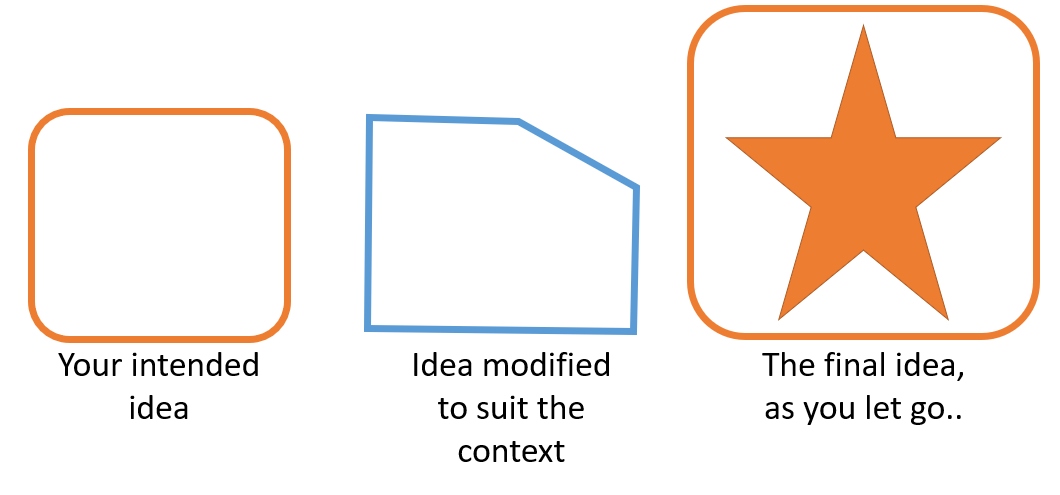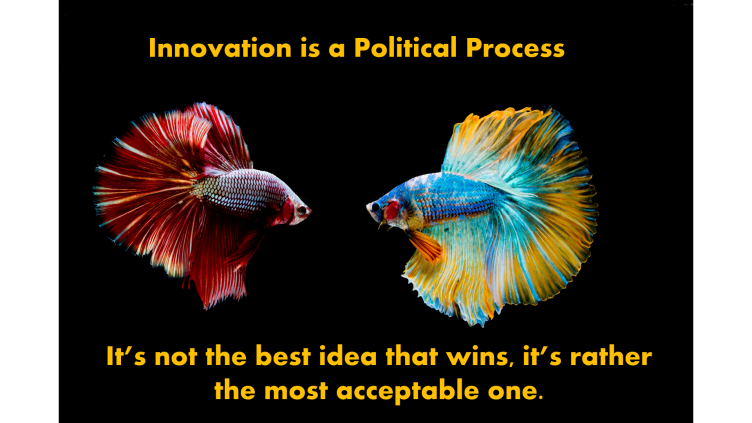Comments
- No comments found

Have you ever wondered why your ground-breaking idea hasn't got any audience?
Nobody is interested in your 'genius' idea and people can't see how wonderful it would be for them. You feel left out, almost like a sitting genius (sitting-in-the-corner genius). Well, the problem is that your idea is genius only in your head, and in nobody else's, and unless you make that idea a winning bet in people's head, it has got no chance.
We often fall for the trap that if you perceive an idea to be a good one, others must be obliged to pay attention to it. Not necessarily. You must persevere to make the idea relevant to your key stakeholders, and answer the question, "what is in for them?". And even if it demands to modify the idea in the pursuit of making it acceptable, so be it. It's all worth the effort.
Let us look at organizational innovation from the perspective of ecology. As Charles Darwin reminded us-- "It is not the strongest of the species that survives, nor the most intelligent that survives. It is the one that is most adaptable to change." All species continue to mutate, and the ones which are the best fit with the environment survive and then replicate. Which means that the environment is the determinant and the species must persevere towards fitment, or acceptability.
In the organizational realm, the winning idea is the one which has maximum takers, even if it is the suboptimal one (in your expert view). Once the idea has takers and people rally around it, the idea can always reach its true potential and even beyond. Below is an illustration.

The evolution of an idea, as selected by the organizational context
When you let go of your idea to the organizational selection mechanisms, certainly the idea would see change, may be even a significant alteration, but the emergent idea would be more resilient. It has withstood the test of organizational fit (read, evolutionary fitness).
How do you ensure that your idea is acceptable to a wider audience, including the one which may not be apparent immediately? The method is to map out the key stakeholders -- their aspirations and fears -- and then ensure that your idea addresses those.
The tool at hand is the Stakeholder Map.
Let's define a stakeholder as someone who is either a part of the problem or a part of the solution. The one who is directly or indirectly impacted by your idea, or the original problem. For the purpose of explanation, let's take the idea as: 'Introducing tinkering labs for experimentation and learning in primary schools'. Who are the main stakeholders? What are their primary aspirations and fears, with regards to this idea? Below is the map.

Stakeholder Map for 'Tinkering Labs in Schools'
As you see in the mindmap, there are, at least, eight key stakeholders for the idea at hand. For each stakeholder, aspirations (++) and fears (--) are identified. While the list is only indicative, you already get an idea that there are some stakeholders who don't have much motivation to implement the idea. The likes of Regulators, or even School Staff, are ambivert at best, but can clearly see the issues with the idea. And if you don't attend to their trepidations or lay out clear motivators or incentives, they would be your biggest roadblock in seeing the idea through.
The political skills here are to understand and appreciate the concerns of various constituencies and work on your idea and the execution plan while factoring in their inputs. When you actively seek suggestions from your stakeholders you not only get knowledgeable, but also strike a rapport, which goes a long way in helping your idea navigate the institutional maze.
So, next time you are conferred with difficult parties at your office and beyond, take time to understand them and their fears and aspirations. It's best to list those down and systematically work on your idea or plan to factor those in. It will, no doubt, delay the process, but your odds of a lasting change are higher. Moreover, you can avoid burning bridges or causing avoidable stress for yourself and others.

The ability to navigate the politics with deftness is what distinguishes an innovator from an engineer.
Hope this helps.
Dr. Pavan is an Innovation Evangelist by profession and a teacher by passion. He is the founder of Inflexion Point, a strategy and innovation consulting. Apart from being an Adjunct Faculty at IIM Bangalore, Pavan has consulted with leading organizations on innovation and creativity, including 3M, Amazon, BCG, Deloitte, Flipkart, Honeywell, and Samsung, amongst others. Pavan was the only Indian to be shortlisted for the prestigious 'FT & McKinsey Bracken Bower Award for the Best Business Book of the Year 2016'. He has also been invited four times to speak at the TEDx. For his work on innovation, Pavan bagged the prestigious ‘On the Job Achiever’ Award at Lakshya in 2007 at NITIE Mumbai. Pavan works closely with CII, Bangalore Chamber of Industry and Commerce, European Business Group, FICCI, Karnataka Knowledge Commission, NHRD, and World Trade Centre, towards shaping their innovation activities. Pavan is a mentor for NSRCEL at IIM Bangalore, Founder Institute, Institute of Product Leadership, Brainstars, Budli, HackerEarth, and UpGrad, and is on advisory board for VC firm- Utilis Capital. Pavan is also a columnist at YourStory, Entrepreneur India, Inc 42, and People Matters. He is a Gold Medalist from MBM Engineering College Jodhpur, and did his PGDIE from NITIE Mumbai. Pavan finished his Doctoral Studies from IIM Bangalore in the domain of innovation management. More on his work is available at www.PavanSoni.com.
Leave your comments
Post comment as a guest